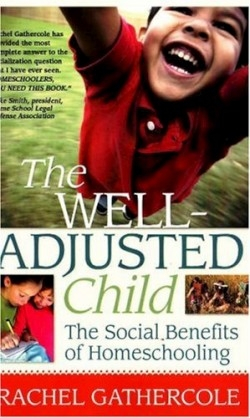The Well-Adjusted Child
The Social Benefits of Homeschooling
From the astute mind of Rachel Gathercole comes The Well-Adjusted Child, considered by many to be the definitive book regarding the socialization question surrounding homeschooling. By discussing what homeschooling is—and is not—and what homeschoolers actually do during their day, Gathercole dispels the myth that even she herself once believed: that homeschoolers are “lonely misfits, incapable of simple conversation and pathetically starving for any kind of interaction with the outside world.” As a homeschooling parent for ten years, and tired of questions about the “S” word, Gathercole exhaustively researched this topic by reading the experts, looking into what outsiders’ opinions are, and most importantly, interviewing hundreds of homeschoolers. She uses this research data and the real-life stories of these homeschooling parents and their children to support her arguments throughout her book as she discusses, in a very easy-to-follow conversational tone, several topics related to how homeschoolers are socialized; some of these are: friends and peer contacts, independence and strong family relationships, bullying and adversity, and diversity.
Gathercole states, “What the public doesn’t know is that homeschooling offers children many social benefits above and beyond what is offered by the institution of school.” And homeschoolers support this by making it abundantly clear that homeschooling is not just an at-home version of what goes on in traditional schools, minus the ability to have contact with their peers. Norma, a homeschooling mother from Big Flats, New York, sums it up best for homeschoolers: “Being homeschooled doesn’t mean that you don’t spend time with other children. When you look at a classroom situation, it’s very controlled. What opportunity do children have to socialize? Only recess, which is about fifteen minutes a day, and lunch.”
Fifteen-year-old Julian from Katonah, New York, adds this sentiment: “I feel like I have fewer acquaintances and more true friends who would stick with me through hard times. Those are the friends who really count: the ones who actually care about you.” Homeschooling has an infinite variety of forms (depending on what each family decides is best for them) and homeschoolers have the freedom to be out in the community and with other homeschoolers whenever and wherever they want.
Homeschoolers do have friends and, just like other children, they get time away from their families by joining sports teams, going to camp, babysitting, going to the mall, etc. And, as Gathercole points out, “[M]any homeschooling parents are careful to stay out of the child’s way as much as possible, not stifling but quietly supervising from the background.” She then goes on to explain why closer relationships with their parents and other adults through homeschooling are better for homeschoolers than peer contact in many instances—such as learning conflict resolution skills and tolerance for a diversity of people—with research data to support her claims. Not only are parental relationships looked at, but Gathercole also discusses the advantages of closer sibling relationships and how they positively affect future relationship with others.
Continuing to look at socialization in the areas of bullying and adversity as well as diversity (which many outsiders contend that homeschoolers are not taught to deal with), Gathercole uses a common sense approach about both, mentioning that the key advantage is that the parents are available to help teach their children how to deal with both situations: Lauriann of Las Vegas, Nevada, says of removing her children from public school: “Everything from being physically harmed to being teased and shamed [has turned around] …with the homeschoolers in our group, the children have fun, and … disagreements are a rarity.” And Theresa from Ontario mentions, “… our group [has] Jews, Presbyterians, Atheists, and Baptists …[my son] is more than exposed to diversity.” Once again, research data and many more examples from homeschoolers and their parents are used as evidence and to help the reader understand how it applies to the socialization question.
Many experts from traditional educational establishments do not understand what homeschooling is all about, and have blindly criticized homeschooling over precisely what is so succinctly defended through the above topics and others included in Gathercole’s work. This resource is invaluable for those who are thinking about homeschooling, but are afraid that their children will somehow be “missing out” if not traditionally schooled; for those who are already homeschooling, but need a resource to help explain it to those who do not understand homeschooling; for the public at large to dispel their own misconceptions; and especially for the “education experts” of the traditional schooling philosophy who no longer can ignore the fact that homeschoolers not only prosper by learning in myriad ways in myriad places, but flourish socially as well.
Reviewed by
Nelly Heitman
Disclosure: This article is not an endorsement, but a review. The publisher of this book provided free copies of the book to have their book reviewed by a professional reviewer. No fee was paid by the publisher for this review. Foreword Reviews only recommends books that we love. Foreword Magazine, Inc. is disclosing this in accordance with the Federal Trade Commission’s 16 CFR, Part 255.

